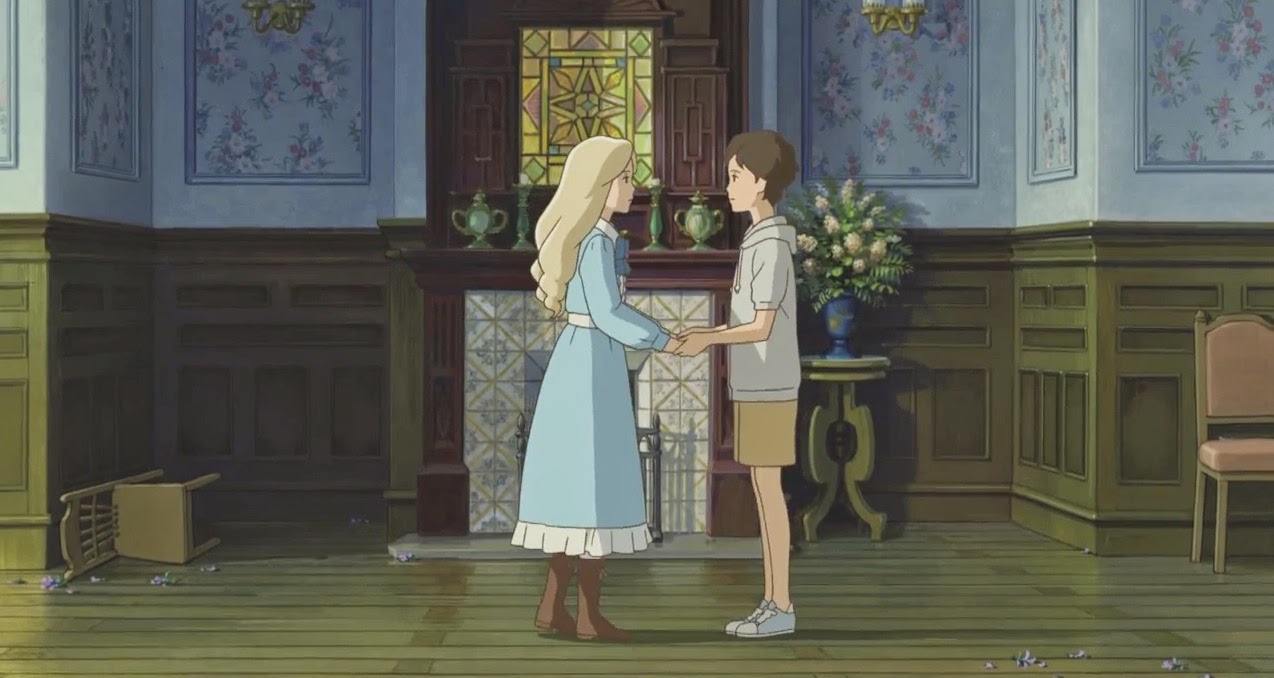When Marnie Was There is the latest -- and perhaps final -- film from Studio Ghibli. Based on a somewhat beloved children's novel by author Joan G.Robinson, the story tells of an orphaned young girl named Anna.
In her words, Anna considers herself something of an outsider with no friends to call her own. Her guardians become increasingly worried with their adopted daughter's verging detachment and decide that it might be best for Anna to spend her summer vacation away from home. With her bags packed, Anna boards a train and heads to a small village on the northern shores of Hokkaido where she meets and stays with distant relatives.
Once there, Anna enjoys her days exploring the quiet seaside town while also going out of her way to avoid contact with the local bratty kids of the village. One day while exploring the sea-side, she spots a grand yet deserted manor on the other side of the bay. As time passes, her fixation with the strange mansion grows. Despite the fact that the house looks abandoned, Anna eventually meets a young pretty blonde girl by the name of Marnie. Marnie is quite enigmatic, to say the least, but none-the-less Anna gravitates to her almost instantaneously as the two strike up a friendship.
For the most part, When Marnie Was There is a simple tale of a young girl finding friendship and love through the most unexpected of means. Upon first introduction to Anna, it is all too abundantly clear that she has suffered severe hardship in her past with the untimely death of her parents.
Uncertain as to where she fits in the world and dubious of whether or not her guardians truly love her as if she were their own, Anna is by all means of the word fractured. Despite her eagerness to remain an outsider, it's clear that even if she would like to connect that Anna struggles to connect with her peers. It's only with the arrival of Marnie that she finds herself truly able to open up. The two are polar-opposites, Anna being reserved and tomboyish in appearance while Marnie is far more boisterous, outgoing and traditionally feminine in attire. As the old saying goes, opposites attract.
Undeniably, for as attentive and caring as Marnie is towards Anna, it can't be overlooked that Marnie is still a bit strange, and as such there is an undeniable mystique surrounding her presence. Also, worthy of note the house itself inhabits a bit of an eerily calm presence about it as the ghosts of the past stains the interior decor. The mystery involving Marnie further intensifies. Is Marnie really there? Is she just a figment of Anna's dreams? Or is she something else entirely?
What it all boils down to in the end is something rather poignant and incredibly touching. It is a film solely about the bonds of friendship and how friendship can help the healing process of learning to forgive and love ones self. Refreshingly, there is almost no instance of a love interest for Anna and Marnie to swoon over. Instead, it is simply their tale of innocent friendship that makes up the core heart and soul of the film.
In the animation department, it's about as beautiful to look at as one might expect from Studio Ghibli. The hand painted backgrounds capture the essence of a small quiet country town to a tee. From the lush waterside backdrop to the quieter and incredibly striking somber moments of a little girl clutching her doll at her parent's wake. It's certainly very well drawn and animated as a whole. It's very rich, vibrant and altogether lovely to look at but perhaps to a slight fault.
Despite my swooning over the traditional Ghibli style, it doesn't do anything that we haven't already seen from Ghibli. It doesn't have the same immediacy of experimentation going for it that Takahata's The Tale of Princess Kaguya had nor does it have the grand sense of delivery that Miyazaki's work has had in the past. At its worst, you could simply say that Director Yonebayashi is still yet to develop his trademark style.
Unlike the last two films to come out of Ghibli, When Marnie Was There certainly fares a better chance at finding an audience here in the west. While Miyazaki's The Wind Rises was bogged down in political debate that helped divide audiences. Meanwhile, Takahata's Tale of the Princess Kaguya was perhaps too engrossed in Japanese folklore for a western audience. Marnie, on the other hand, could very easily play towards the Frozen crowd. Maybe not to the same scale, but the similar themes of finding love through friendship could very easily make it all the more accessible to a Western Audience.
While it never quite reaches the levels of Miyazaki or Takahata's output, it's still without question a very sweet and loving tale that certainly fares up there as being one of Ghibli's better works.
★★★★
(out of Five)
-Daniel M

.jpg)











0 comments:
Post a Comment